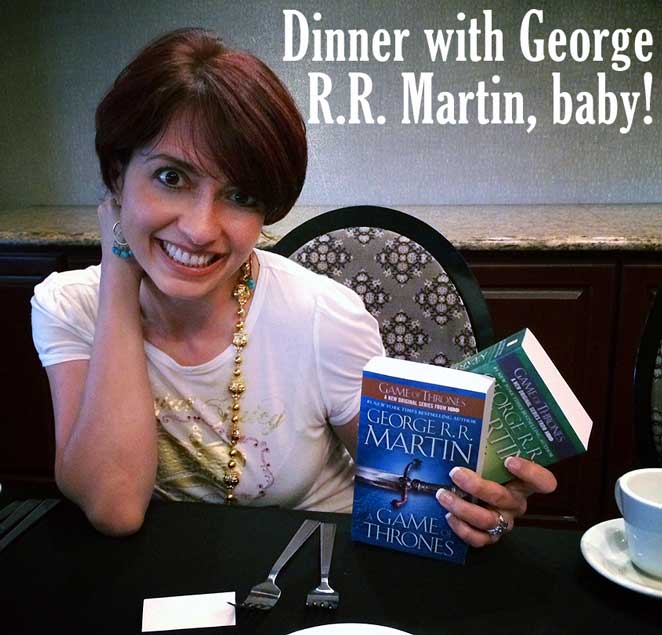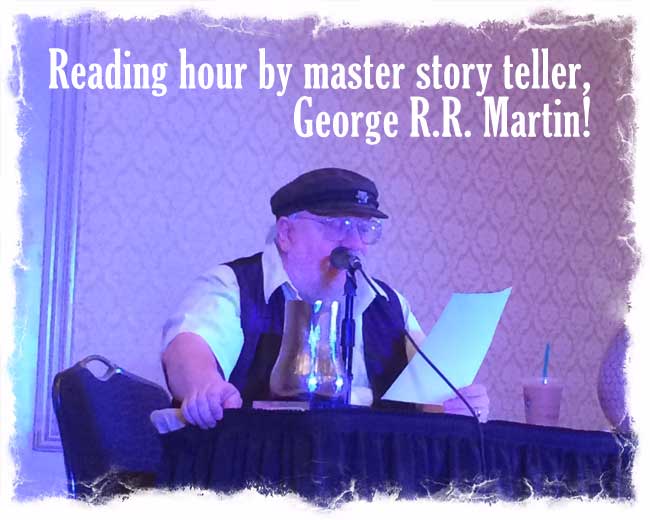What do you mean you don’t like fiction?
Everyone has a hero. A hero inspires you to question the status quo, to think differently about an old concept, to rise above your modus operandi. A hero is someone that not only pushes you to a new height, but also makes you giddy with confidence about your own ability to master your craft and rise beyond your limitations.
My hero is George R.R. Martin and I met him and dined with him at ConCarolina 2014. It was ridiculous fun and inspiration and now it’s time to put that inspiration to work.
Do you read fiction? I Love Fiction. I inhale good fiction. I cannot imagine a world without fiction.
In fact, I can’t relate to you if you haven’t at least once in your life fallen hopelessly in love with a fictional character.
Reading or writing fiction are not a waste of time and taking a break from reality is not without its many great benefits. After all, it is the power of your imagination that makes all your dreams possible, and fiction helps you cultivate that side of your brain.
Great fiction is still a rare gem and those who create it for us are, in my mind, extremely special human beings. Ever wonder:
- What goes into writing great fiction?
- How do you stay motivated to write great fiction?
- What does an aspiring writer need to know about the craft?
- What makes us obsessed with Game of Thrones and the book series so much?
We asked George R. R. Martin for his thoughts during dinner and panel discussions and well, he answered.
15 Secrets to Writing Great Fiction from George R.R. Martin
To my aspiring writer friends, here are the 15 secrets to writing great fiction directly from the source, the mastermind behind Game of Thrones TV show, the creator of A Song of Ice and Fire series, Mr. George R.R. Martin:
1. On getting past the ‘writer’s block‘ once and for all:
Just sit your a$$ down in front of the computer and Turn It On. If you want to be a writer, you must write. This seems obvious but a lot of people who say they want to be a writer never quite get around to writing. Sometimes they even have very specific story ideas and they tell you about it at a party or in an email but they never actually sit their a$$ in the chair and write and that’s not a writer, that’s a talker. If you want to be a writer, you have to write.
2. On your books not being for every type of reader:
Different books are for different people. We each read for our own reasons. There are lots of stories where the boy gets the girl and the hero kills the villain. That’s not what I write about.
3. On developing the habit of writing:
Write. Write everyday. Write as much as you can. Finish something and send it off. Then write something else. Keep writing.
4. On becoming a writer and writing for a living:
You have to keep doing it if you want to make it a profession. It’s not an easy profession. It’s not easy to do the work. It’s not easy to persist and build a career because you’ll get a lot of rejection. People who make it in the long run are the people who keep doing it. And hopefully you are of the right temperament for it.
5. On not writing for the wrong reasons:
Write for the right reasons. There are people who want to be a writer but for the wrong reasons. Status and fame and money are good perks but not good reasons to write. Write because you have stories that you must tell and nobody – nobody – can talk you out of telling them.
6. On learning from both criticism and praise:
You need a certain amount of praise along the way but you need the criticism too. Your mother will always like what you write by large … unless you have a really nasty mother. But you have to give it to other people too and hear what they say. When they praise you, let it encourage you and when they criticize you, learn something from it. You just gotta keep doing it.
7. On you alone being in charge of the outcome of your story:
Art is not a democracy. People don’t get to vote on how it ends.
8. On delivering your work without compromising the quality:
Ten years from now, no one is going to care how quickly the books (A Song of Ice and Fire series) came out. The only thing that will matter, the only thing anyone will remember, is how good they were. That’s my main concern, and always will be.
9. On tempering the fantasy and magic in your fiction:
Pour the magic in your fantasy story as you would salt in a meal. Just sprinkle a little because if you put too much, all you’ll taste is the salt. I want magic but I want magic handled subtly and with a certain amount of ambiguity.
10. On keeping track of your world building and characters:
I use my brain. But I do refresh myself all the time. Sure I have notes and documents I reference but when I shift gears, I re-read the previous 2-3 sometimes 4-5 chapters by that POV character before continuing the story in their voice so I get inside their head and remember what they are dealing with.
11. On finishing what you write, the shockingly-obvious advice:
You must finish what you write. No one is buying fragments. Noone is buying scenes or episodes. If you want to be a professional writer, if you want to actually write things people are going to publish, you have to make yourself finish the stories that you begin. A good story needs a beginning, a middle and an end.
12. On marketing your story once you finish it:
Most writers don’t do it. They have novels in their trunks and short stories in their drawers. Or they send it out once and they get rejected and then never send it out again. No. You must keep sending it out.
13. On not touching your story when you market it:
Do not fiddle with your story after you send it off to your editor. That endless fiddling with the story won’t get you anywhere. When you finish your story, put it on the market. When it comes back from an editor, put it in an envelope and send it to another editor. Preferably on the same day. If the editor comes back with suggestions, then you have a direction and that’s when you re-write. If you want to.
14. On creating the experience for the reader, not just saying what happened:
My view as a writer is that I want to put you in the scene, no matter what the scene. I want to put you there and give you the feeling of it. I don’t want to write that someone sang a song. I want to give you the lyrics.
15. On starting your writing career with short stories:
If you are a young writer or a beginning writer at whatever age, start with short stories. When you are new, you are going to write some bad stories and you’ll experiment with techniques as you should in order to use your tools. If you write a short story, you’ve wasted a month at most. When you write a bad novel, you’ve wasted one or more years. Learn your craft first with short stories. Another advantage is if you start selling those short stories, then people get to know your name and when your first novel comes out, the introduction isn’t ‘Here’s a novel by some writer you’ve never heard of.’ but rather, ‘Here’s the long-awaited first novel by this rising young writer that you’ve seen in all these magazines.’ This way you give yourself the best possible chance to succeed as a writer. That’s how I did it.”
The sources used for this article: ConCarolina conference panel and conversations with George as well as the George R.R. Martin podcast series in 2006.
The secrets to writing great fiction may not be what you expected but just because they are obvious and simple doesn’t make them easy!
If you are looking for a silver bullet to establish yourself as a writer, you will be sorely disappointed, but if you follow George R.R. Martin’s advice and believe in the stories that your heart is aching to tell on paper, then you shall be rewarded with sweet delights.
So as you pack your writing tools, pack up your self-confidence. In fact, speaking of writing, grab my 21-step confidence building book to stay motivated as you tackle your first novel or short-story … or even blog post!




 I am Farnoosh, the founder of Prolific Living. So glad you are here. My mission is to empower you to unblock your creative genius to live your dream life.
I am Farnoosh, the founder of Prolific Living. So glad you are here. My mission is to empower you to unblock your creative genius to live your dream life.